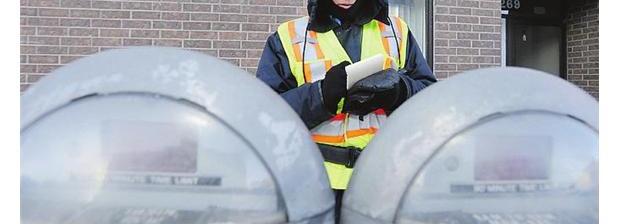March 5th, 2015
Final days for parking foot patrol
by Andrea Hill
Neil Wouters, supervisor of parking enforcement for the North Saskatchewan Commissionaires, says the six “walkers,” including Scott, will be trained to use the license plate recognition technology as the pay stations are activated.
in his three and a half years handing out parking tickets, Ryan Scott has been sworn at more times than he can count.
He’s been called names, screamed at, shoved and almost run over by an angry driver.
“It’s not an uneventful job, that’s for sure,” Scott says with a chuckle.
Scott is one of six full-time parking enforcers for the City of Saskatoon who patrol downtown beats on foot every day, slapping tickets on cars parked at expired meters.
It remains unclear what his job will look like as the city’s parking meters are phased out and replaced with new pay stations that allow parking bylaws to be enforced with licence plate recognition technology.
“It’s a sign of the times. It’s progress, right?” Scott says, shrugging as he trudges by one of the 325 new pay stations that will become operational in the next six weeks.
Neil Wouters, supervisor of parking enforcement for the North Saskatchewan Commissionaires, says the six “walkers,” including Scott, will be trained to use the license plate recognition technology as the pay stations are activated. Some walkers will start by trekking along their routes with hand-held license plate recognition scanners that will determine which vehicles have paid to park. Once the city gets more vehicles equipped with license plate recognition technology, Wouters says some walkers will likely be trained as “mobiles” to search for parking law violators from behind the wheel.
“A lot of times people don’t like change, but this is definitely for the better,” Wouters says. “Let’s face it, the mobiles are going to get around a lot quicker than the walkers are.”
Scott, who says he loves walking for a living, didn’t talk much about the uncertain future of his career Tuesday as he prowled along Third Avenue looking for cars at expired meters. Instead, he talked about the defining moments of a job that will probably never again exist in its present form in Saskatoon.
“It’s the best shape I’ve been in in about 10 years, which I like because I’m no spring chicken,” he said. “My appetite’s a lot better, I drink a lot more than I used to water-wise to stay hydrated. I’m just healthier; it’s a healthy job.”
Since starting the gig, Scott said he’s learned to bundle up to ward off frostbite in frigid winter temperatures and has developed a thick skin to deal with the many disgruntled people he interacts with every day.
“No one likes to get a ticket,” he said. “I’ve been verbally accosted on many occasions, too many to count actually. I just turn and walk away, don’t incite them.”
He remembers once being chased up the block by an elderly lady with a cane who looked to be in her mid-80s. She asked him to cancel the ticket. He told her he wasn’t allowed to.
“She looks at me and goes ‘Asshole,’ and turned and walked away. I just started laughing, I couldn’t help myself,” Scott said.
Last winter, he was crossing Avenue C by 20th Street when a driver discovered a ticket he’d been given and got into the vehicle in a rage.
“He just sped up and I could hear the tires spinning. I looked and he started driving towards me, he was trying to hit me,” Scott said. “And then he had the audacity to stop on a dime, roll down his window and ask me why I gave him a ticket.”
Wouter said only a small percentage of people who get tickets assault parking enforcers, “but you take a small percentage of a huge city and it’s quite a few.” He estimated police intervention is required for five or six serious altercations per year involving parking enforcers.
Wouters said the activation of pay stations, which could eventually take parking enforcers off the roads, could reduce verbal and physical abuse against workers.
For Scott, it’s all part of what makes the job “interesting.”
“They’re little incidents I get to tell at the supper table,” he said.
Sixty parking stations are currently active in the city, including 35 that were activated last month along Second Avenue and 21st Street.
Another 25 were activated Wednesday on First Avenue between 20th and 23rd Streets and on 20th, 22nd and 23rd Streets between First and Fourth Avenues.
All stations are expected to be operational by April.
Once that happens, parking meter heads will be removed. The future of the posts is still being determined, but Andrew Hildebrandt, the city’s director of community standards, said some may be converted into bike racks or something decorative.

